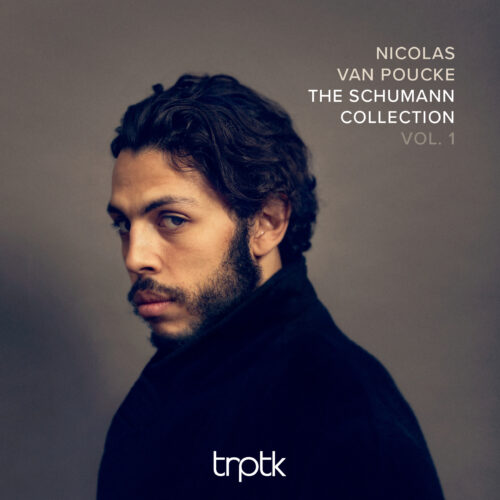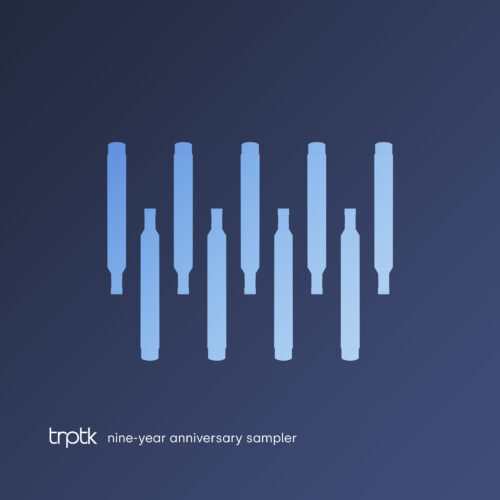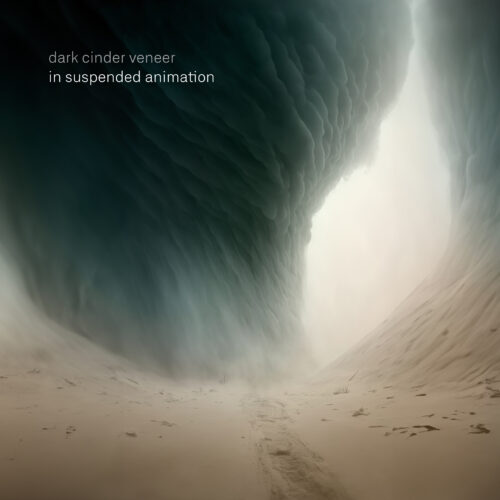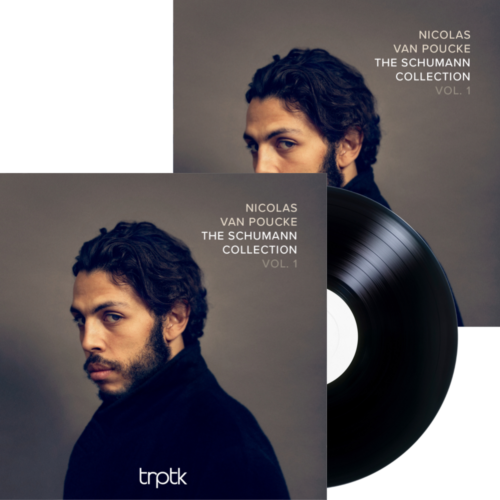Pianist Nicolas van Poucke set to record a collection of his favorite works by Robert Schumann. The Schumann Collection, Volume 1 is the first album in that series. The new Stereo and 5 Channel Surround sound recording features Schumann’s Carnival, Op. 9, Fantasiestücke, Op. 12, and as icing on the cake, Arabeske, Op. 18.
The album is available at NativeDSD in Stereo and 5.1 Channel Surround Sound DSD plus 5.1.4 Channel Auro3D Immersive Surround Sound.
“This is what I love so much about Schumann’s music. If I play Mozart, for example, you make up your own story connecting the pieces and stimulate your fantasy around them. You must create a narrative you play the program within. And that’s totally the opposite of what the composer originally meant with it, but it gives you structure in the fantasy around the piece.
With Schumann, though, it’s a different kind of story. He clearly tells you what he means, or envisions, with his music. You just need to get as close to what he meant as possible. I try to get myself into that sphere – which is an enormous task in itself – and then you still must be able to communicate that by converting all of this into the technical and mechanical side of things.
In the end, it’s about pressing keys on a keyboard. You can think of it as artistic big deal and all, but it’s just as much simply a craft. It’s all in translating what’s written on paper into playing the instrument, materializing this fantasy world into the mechanicals of it all.”
Nicholas van Poucke, Pianist
You can read more about this album in an interview featuring TRPTK’s Brendon Heinst and Pianist Nicolas van Poucke in this article on the NativeDSD Music Blog.
Tracklist
Please note that the below previews are loaded as 44.1 kHz / 16 bit.Total time: 01:12:39
Additional information
| Label | |
|---|---|
| SKU | TTK0055 |
| Qualities | DSD 512 fs, DSD 256 fs, DSD 128 fs, DSD 64 fs, DXD 24 Bit, FLAC 192 kHz, FLAC 96 kHz |
| Channels | 5 Channel Surround Sound, 2ch Stereo, Auro3D, 2ch Stereo & 5ch Surround |
| Artists | |
| Composers | |
| Genres | |
| Master clock | Grimm Audio CC2 at 352.8 kHz |
| Recording location | This album was recorded on June 26th and 27th 2020, at the Westvest Church in Schiedam (NL) on a Steinway & Sons Model D-274 (#565253) concert grand. |
| Recording Engineer | Brendon Heinst |
| Piano Technician | Charles Rademaker |
| Mastering Engineer | Brendon Heinst |
| Microphones | DPA d:dicate 4006A – DPA d:dicate 4015A |
| Executive Producer | Gilles Stoop |
| Digital Converters | Merging Technologies Hapi – Merging Technologies Anubis |
| Cables | Furutech custom microphone cables – Furutech custom power cables – Furutech custom loudspeaker cables |
| Original Recording Format | |
| Instruments | |
| Release Date | November 13, 2020 |
Press reviews
Audiophilia
This is The Schumann Collection, Vol. 1 (Robert Schumann, 1810-1856), the first album in a series and features Carnaval, Op. 9 (1834–1835), Fantasiestücke, Op. 12 (1837) and Arabeske, Op. 18 (1839), three of Schumann’s masterpieces for solo piano.
Poucke is Amsterdam Conservatory-trained and has been mentored by some of the greatest keyboardists of the past 80 years, including Murray Perahia, Alfred Brendel and Martha Argerich.
The resplendent recording took place in Westvest Church, Schiedam. van Poucke plays a Steinway Model D-274.
The Netherlands has many flawless examples of Dutch Reform Churches (and other denominations), all blessed with gorgeous acoustics—the preferred locale for many of the TRPTK recording sessions. Engineer Heinst is particularly good at capturing the ambience of each church. As all the recordings are solo, chamber or small ensemble, there is both intimacy and immediacy.
Fortuitously, these Schumann pieces are often paired together on recordings and in concert and are among my favourite works for the piano. The famous duality of Robert Schumann’s musical self, passionate ‘Florestan’ and dreamer ‘Eusebius’, are in full flow in these works. Lovers of turmoil, sturm und drang will certainly get their fill and the more reflective listening audience will appreciate Schumann’s delicate voicings and exquisite melodies. Either way, van Poucke understands the weight and command Schumann’s great works need. So, gentle melodies are dispatched with beautiful, elegant phrasing and Florestan gets weighty and powerful treatment. The difficult technical demands are no issue for the pianist.
van Poucke’s technical wizardry is always in service to Schumann’s music. Listen to ‘Traumes Wirren’ (Dreams Confusions) from Fantasiestücke to experience solid technique in the service of musicality when the technical demands are famously difficult. With so many young pianists, the technique serves to show off. As the quote on his website landing page says: ‘The young freethinker among Dutch pianists’. van Poucke serves Schumann first, the listener second.
van Poucke allows the phrasing to unfold naturally. What you’ll hear is a brilliant young performer playing a magnificent Carnaval and an equally prodigious Fantasiestücke (with the happy bonus of Arabeske, Op. 18) in a beautiful acoustic. Very highly recommended.
NativeDSD Blog
Is it fair to say that the best recordings are made by people who love music and want to do it the way they would like to have it for themselves? TRPTK’s quality statement: “No costs or efforts are spared to seize that magical moment in which music is being created and bring it home to you in the highest quality”, is not just a PR matter. It is real. Listen to this new release by Dutch Wonder Pianist, Nicolas Van Poucke. He is more than a great pianist. He is a natural talent able to enthrall an audience.
There are many great pianists and numerous are their recordings of Schumann’s piano legacy. But however good they are, few can captivate an audience to the point where they lose any sense of place and time. Just the music. This is what happened to me. I had never heard of Nicolas before, but once hooked I couldn’t stop listening. He opens, as it were, the door to the enchanting world of Schumann, taking the listener by the hand to discover parts you didn’t think existed. How? It has all to do with his ability to phrasing, coloring, and shading the score to allow the listener to ‘see’ what must have moved the creative spirit of Robert Schumann. It is not just about technique. It is the undefinable and undeniable gift of a true artist to translate the programs attached to Carnaval and Fantasiestücke into an intelligible vision for the listener.
Some scholars have argued that the fantasy world of young Robert Schumann was already a premonitory sign of his future schizophrenic state of mind. I have listened to pianists with this projection in mind. The result was as bad as one could imagine of someone identifying with a composer already on the loose. To my great relief, this is not van Poucke’s take. There is nothing of irrational behavior in his interpretation, other than what is perfectly logical in the mind of a creative artist. Fairytale talk with opposing, exciting, and moving elements. Despite Schumann’s markings, no account is the same nor even similar and I happen to like Nicolas van Poucke’s intense and well-considered tale.
The 8 Fantasiestücke are further examples of Schumann’s wonderland creativity. Written for Ms. Anna Robena Laidlaw and inspired by Hoffmann’s Erzählungen, it has all the hallmarks of dualist romance between Eusebius the dreamer and Florestan the passion, lovingly yet powerful interpreted by van Poucke giving expression to confusion and Schumann’s feelings toward a 19-year-old beautiful Scottish female pianist.
With a very personally nuanced account of Arabesque van Hoecke concludes his recital, saying in the liner notes: “If you … don’t want to end up being the one out of many, you really need to add something to it”. To which I say: “Perfectionism is one thing, natural talent adds another”. Never afraid of doing the unexpected, keeping the listener on edge, which is how Nicolas van Poucke distinguishes himself from the crowd in this first volume of “The Schumann Collection”. I cannot wait for the rest to follow.
Het Parool
Nicolas van Poucke belongs to a young generation of Dutch pianists who are endowed with cheerful and hopeful immense talent, which makes you wonder how far that will take him. At the age of 28, at least up to the Queen Elisabeth Hall in London, where he played Beethoven’s Third Piano Concerto last September with the Chineke! Orchestra – for a completely empty hall.
That remarkable time during the Covid pandemic also enabled him to work on his second album in peace. The first, with works by Chopin, was critically acclaimed. Number two can also be cheered on. The Schumann Collection Vol. 1 is the title. Guaranteeing that there is even more Schumann in the pipeline in the coming years. Judging from Volume 1, that’s something to look forward to.
Few pianists manage to approach this musically and psychologically complex world with so much naturalness. Van Poucke plays the 21-part Carnival, which can be understood as a fragmented self-portrait, with a rich touch and a lot of musicality. Even more beautiful is the Fantasiestücke, which Van Poucke brings to life with a beautifully dimmed tone.
In the closing Arabesque he shows daring rubati. The eight minutes will be over before you know it.
Positive Feedback
What a pleasure to listen to this quite extraordinary pianist, Nicolas van Poucke, in this new release from TRPTK. His performances of the Schumann works on this album are totally engaging, full of musical intelligence and emotional depth.
There are so many performances of Carnaval by great pianists such as Rubinstein, Katchen, de Larrocha, Michelangeli, Cortot Anda, Arrau, Freire. Why am I recommending this new performance by van Poucke?
I’m recommending it for two reasons: 1) he really does have a unique voice, something different to share in this music and 2) this is the best sounding recording of Carnaval that you’re going to find—it’s worth adding to your library just for the superb sound quality. For my music listening, I enjoy having both qualities.
Nicolas takes a more deliberate, more thoughtful introduction to the first movement on this recording, the Préambule of Carnaval by comparison to some other pianists. He plays this first movement with some contemplation of where this is all going, with just a hint of a lingering phrase here or there. For me, this bodes well. I get tired of the renditions that are all “hell bent for leather,” beating these notes out as fast as demonically possible and to the point of losing any meaning to the music. I won’t list for you the numbers of performances I find doing this, let me just say that Nicolas achieved so much more in his first two minutes and nineteen seconds.
This thoughtful approach to Schumann’s music continues throughout this recording. Not just in the Carnaval, but also in the Fantasiestücke and the Arabeske. He plays demonically fast and powerfully when called for but is willing also to linger when appropriate and to savor a phrase.
In the opening movement of Fantasiestücke, for example, Nicolas plays delicately, lingeringly, gently savoring the moments, with delicate spacing between notes allowing the reverberation of the strings to expand and fade away. Then he launches “Aufschwung” (the next movement) with a flurry of declaiming notes and energy; not pounding away furiously, no. This is still well judged, shapely phrased playing, full of intention and meaning. Well done!
The recording quality with which these performances are presented is another excellent accomplishment by Brendon Heinst. Well done! The sound has a resonant, reverberant yet open quality. We are close into the piano, hearing the initial transients of the hammer strikes with immediacy and basking in the reverberations of the strings. This is, to me, more the artist’s perspective on the instrument than an audience member’s perspective. And this is the producer’s and recording engineer’s choice to make. The recording is a work of art designed to create an emotional response. And it does. It creates in this listener quite a thoroughly engaged, full immersion, response to the music.
In summary, these are performances I find very attractive. I fully expect to come back to them again and again, as I have already done over this past week since the recording was released.
Opus Klassiek (Opus Classic)
Not so long ago, the LP above everything else was the motto of Nicolas van Poucke. In any case, he did not want much (more) of the CD, was his message to me. But the tide has clearly changed, prompted by Brendon Heinst of TRPTK, who used the best possible recording technology, state-of-the-art, for his first Schumann album on TRPTK.
After his Chopin album, Van Poucke turned to Schumann this time. Judging by the title of the album: The Schumann Collection Vol. 1, suggests that there is even more Schumann to come. Fortunately, no one needs to regret this sequel either, because Van Poucke knows his way around these romantic piano works particularly well. This is music that suits him well. Just as it was then for Chopin’s piano works. It confirms once again that artistic success usually cannot do without self-knowledge.
In short, stylistically there is much to enjoy thanks to this playing by a Dutch pianist who has long since passed the technique and has thus managed to make the substantive side of these scores his own; and with that also to our music lovers.
His Schumann album has all the positive characteristics of his Chopin recital, although it goes without saying that he ‘treated’ the piano works of the two composers differently. Once again there is that intense concentration and willingness to take (responsible!) Risks within the defined boundaries of the score. The countless details are beautifully and convincingly highlighted, the accelerations and decelerations, melodic and harmonic accents are created from a well-thought-out concept. The entire discourse underlines its uniqueness.
It is also striking how much Van Poucke expresses the split in this music, both in ‘Carnaval’ and in the (8) ‘Fantasiestücke’. He makes it clear with great conviction and expressive commitment that this is music in which traditional boundaries are crossed and it is clear that German Romantic idealism has now had its day. Poetry captured in music that, as in ‘Carnival’, under the hands of Schumann but also that of Van Poucke takes on an unmistakable, cross-border connotation. Intimate, comfortable homeliness that contrasts extremely sharply with the fantasies derived from the thoughtful Eusebius and turbulent Florestan.
With Van Poucke, the form and content of these character pieces (they stem from Schumann’s ‘early’ period, 1835-1839) effortlessly fall into place. This applies to both ‘Carnival’ (the subtitle given to the 21 parts actually speaks for itself: ‘Scènes mignonnes sur quatre notes’) and the more independent character sketches of op. 12 (‘Fantasiestücke’) are beautifully expressed under his hands.
Also impressive is Van Poucke’s view of the dew-glittering final piece: the (well-known) ‘Arabesque’, about which the composer himself remarked that it was nothing more than a delicate salon piece, weak and stylistically light-footed. Van Poucke nevertheless knows how to make a lot of it, just as the piece should sound: ‘leicht und zart’.
I have not kept up with the latest developments in recording technology, but it will undoubtedly suffice for those in the know that this album was recorded in DXD 352.8 32-bit and that the music lover does not need to know anything other than that the Steinway D -274 comes out of the speakers with great authority. Maarten Kools’ cover photo is a small plate with all the characteristics of a nineteenth-century portrait painting. Coincidence?
Only logged in customers who have purchased this product may leave a review.







Reviews
There are no reviews yet.